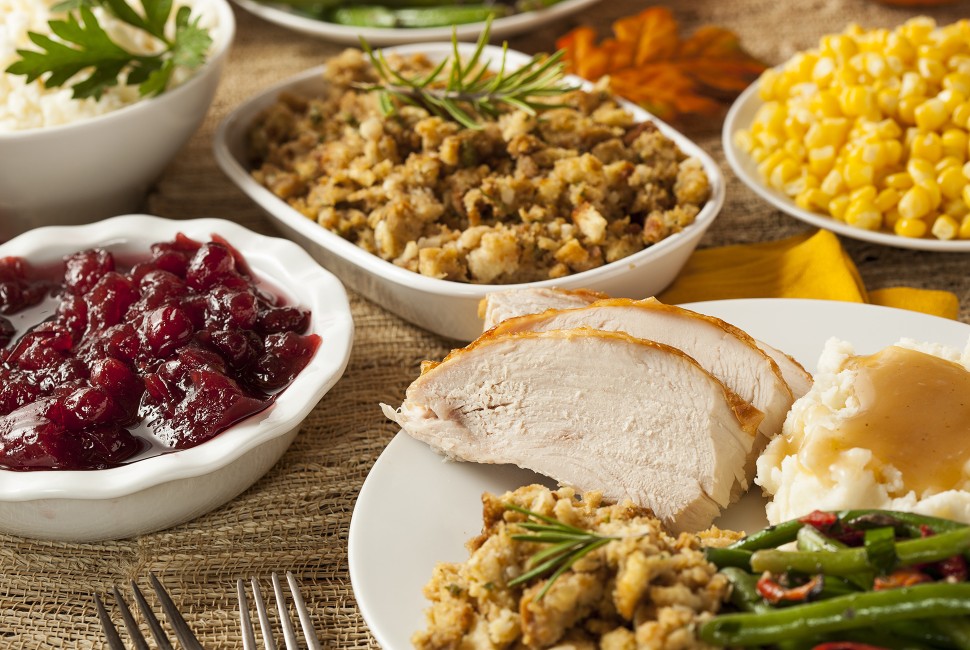Perhaps you’ve already begun bargaining with yourself about Thanksgiving dinner. You won’t eat anything before the feast, where you’ll stuff yourself with turkey and three kinds of pie, and then pay penance by doing an extra-long workout — or two — the next day.
Is that so wrong?
It might be a sign of “disordered or problematic eating,” which can be heightened during the food-heavy holiday season, says a Northwestern Medicine health psychologist. She explains the triggers that impact our eating during the holidays, including family beliefs and traditions around food, common all-or-nothing thinking, influences from fellow diners and even whether you are served buffet versus family style.
The goal, she says, is to enjoy your meals in a psychologically healthy way without abandoning healthy behaviors.
Northwestern Now talked with Alyssa Vela, an assistant professor of surgery and of psychiatry and behavioral science at Northwestern Feinberg School of Medicine and a Northwestern Medicine health psychologist.
What causes stress during holiday eating?
“The holidays can be really overstimulating, particularly when it comes to food. Many people are also around family who may reinforce familial and cultural eating behaviors and beliefs, such as ‘the clean plate club’ that many of us grew up with, or that it is disrespectful to decline food regardless of hunger and fullness. Dissonance between one's current preferences and patterns, and those early messages can be incredibly distressing.”
What are strategies to cope?
“It can be helpful to make some decisions in advance before going into family or social situations. For example, ‘I’m going to eat whatever is served at the holiday dinner tonight, and then I am going to decline after one serving, even if someone gives me a hard time.’
“Another challenge, during the holidays in particular, is the very common all-or-nothing thinking around food. Many people approach things as either going all in or avoiding entirely. Someone might eat a sugary dessert they typically wouldn't have on a weeknight and, instead of savoring the one dessert, they think that the day or week is already ‘ruined,’ so they might as well just keep eating all of the sweets. That sort of thinking and behavior can leave people feeling pretty awful both mentally and physically.
“We also have to give ourselves grace and not be too hard on ourselves. The stress of beating yourself up for eating an extra dessert and/or then eating even more foods that aren’t serving you in response, is so much worse than just eating the desert. We also have to remember that food is really meaningful beyond nutrition, so there are times to enjoy certain foods and ways of eating, and that is okay and important for occasions.”
What’s wrong with a rich meal if you tell yourself you’ll work off the calories?
“We are talking about eating behaviors that are very much tied to thoughts and beliefs about food and eating that can also be disordered. Many people will try to bargain with themselves, for example, saying they need to ‘work off’ x number of calories to compensate for a holiday meal or type of food. This often results in guilt and shame about eating and can trigger negative thoughts about oneself. While exercise is almost always a great idea, it’s this pattern of thinking that can result in more distress, more negative thoughts and emotions, and eventually more problematic eating.”
What is disordered or problematic eating?
“Disordered or problematic eating occurs along a spectrum from mildly disordered to meeting clinical criteria for an eating disorder. Across this spectrum we can see behaviors such as overeating, eating until uncomfortably full, eating in response to one's emotions or eating because of external cues such as seeing someone else eat or not eat.
“These behaviors can be problematic, if they result in distress and/or interfere with managing one's health or goals. Everyone overeats on occasion, and eating is emotional, cultural, etc., but if eating behaviors are causing you a lot of stress or making you feel bad about yourself, that is when we would consider it along that spectrum of being ‘disordered.’”
How can you avoid inhaling the buffet table?
“It might sound counter intuitive, but eating something in advance of holiday parties can be really helpful to make sure you're not overly hungry, to balance blood sugar and even to make sure there is some produce/fiber in the diet so you’re not ravenous. When we are not overly hungry, we can eat more mindfully and really savor and enjoy the appetizers or sweets that might be at a holiday event.”
How can we think about holiday food in a healthy and joyful way?
“Overall, we know that food is an important part of every culture and is often tied to traditions and memories. The key is to acknowledge the role of food and eating for you and your loved ones and to do your best to enjoy it in a psychologically healthy way, which often means really enjoying the special and important meals and foods while maintaining good health behaviors overall.”


